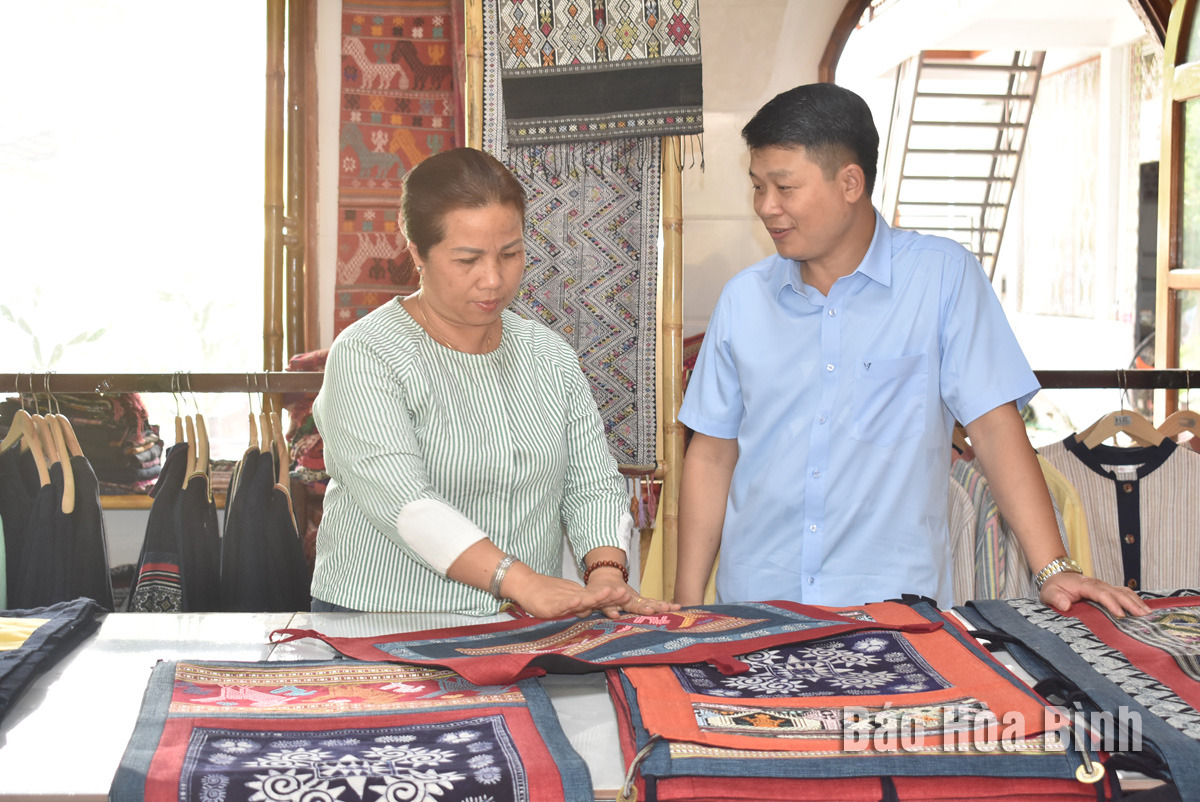
In recent years, the cooperative economy in Hoa Binh province has made significant progress, particularly in the agricultural sector. This development has contributed not only to local economic growth but also to improving livelihoods, promoting rural development, and protecting the environment.
Products of the
Hoa Ban Cooperative in Chieng Chau commune, Mai Chau district, have won
consumer preference in domestic and foreign markets.
Focusing on high-quality agricultural products, the Pham An Agricultural
Production and Consumption Cooperative in Tram hamlet of Hung Thi commune, Lac
Thuy district, has successfully produced and supplied safe vegetables, fruits,
and root crops for major markets in northern Vietnam.
With over 70 hectares of cultivated land, the cooperative recently signed an export
contract with the T9 Vietnam company to grow five hectares of bird’s eye chili
to supply for the Republic of Korean market at 20,000 VND (0.78 USD) per
kilogram of fresh chili, with a plan to expand the area to 10 hectares.
Director Pham Van Toan said the cooperative has created safe and trusted
products to gain consumer trust, serving as a bridge between farmers and
businesses, ensuring stable market access.
The Luong Phu Agricultural Services Cooperative in Tan Lac district,
gathering13 members, operates in agriculture and handicraft production. In
2020, it partnered with a company making handmade thatch products, which trains
cooperative members and guarantees product purchases. This initiative has
provided stable incomes for members, created jobs for hundreds of farmers, and
supported disadvantaged households, according to Director of the cooperative
Nguyen Thi Bay.
To further promote cooperatives, the provincial Party Committee has implemented
Resolution No. 06-NQ/TU, issued in 2021, to encourage individual businesses and
enterprises to join cooperatives, along with an action plan to carry out the
Prime Minister's Decision No.340/QD-TTg, which approved the strategy for
developing the collective and cooperative economy for 2021 - 2030 . Additionally,
conferences have also been held to disseminate legal regulations on the
collective economy to 2,100 participants, including local officials, Party
members, and cooperative members, and hosted multiple policy dialogues.
Market expansion efforts have also intensified. The province has worked to
allocate part of funding from the three national target programs to support
the development of the collective economy. Assistance has focused on helping
cooperatives take part in trade promotion events and distribute products
through e-commerce platforms.
In 2024, the
Cooperative Alliance of Hoa Binh province assisted four cooperatives in
displaying products at the CoopStar Awards and the National Cooperative Forum.
Besides, three cooperatives were helped to showcase products at the 16th
provincial Vietnam Fatherland Front Congress while many others participated in
major trade fairs across Vietnam and the Vietnam-China Friendship Fair. These
initiatives helped cooperatives secure new orders and expand their market
reach.
Last year, the
province also proposed the Vietnam Cooperative Alliance recognise exemplary
products of local cooperatives such as the lemongrass essential oil of the
Thong Nhat Cooperative; solanum procumbens extract of the Tuyet Nhi Cooperative,
and the red-fleshed pomelo of the Tan Lac Red-Fleshed Pomelo Cooperative.
The provincial Cooperative
Alliance said it will continue to disseminate the policies supporting
cooperative economy development, improve the collective economy governance, and
strengthen linkages with enterprises. Efforts also focus on integrating
cooperatives into sustainable supply chains, increasing access to finance, and
recognizing outstanding products.
With strong support from all-level authorities, efforts by cooperatives and
farmers, as well as the effective implementation of support policies, Hoa
Binh’s cooperative economy is set to develop sustainably, thus improving
people's life quality and driving economic progress.
Dao Village’s honey – a product certified with a 3-star OCOP (One Commune One Product) rating by Thong Nhat Agricultural Cooperative in Dao Village (Hoa Binh City) – is highly regarded by consumers for its quality, richness, and variety in packaging. The distinctively sweet taste of Dao Village’s honey leaves a lasting impression on anyone who has tried it.
In alignment with Project No. 07-DA/TU, issued by the Hoa Binh provincial Party Committee on November 1, 2021, Lac Thuy district has actively promoted investment and supported the sustainable development of its industrial and handicraft sectors during the 2021–2025 period. Alongside this, the district has remained committed to preserving and revitalising traditional craft villages.
Located in the northern part of Lac Thuy district, with a temperate climate and fertile soil, Phu Thanh commune has great potential and advantages in growing tea. The long-standing experience, combined with strict adherence to organic farming practices in the tea gardens, ensures that the dried tea products from Phu Thanh and Lac Thuy as a whole are sold out immediately upon production, providing a stable and prosperous life for the local people.
Amid efforts to streamline the administrative apparatus, Hoa Binh province has intensified measures to address challenges in land clearance, resettlement support, and infrastructure investment, aiming to speed up the progress of key projects.
Hoa Binh province has posted an unprecedented economic growth rate of 12.76% in the first quarter of 2025, marking its highest quarterly performance to date and positioning it as the second fastest-growing locality in the country, trailing only Bac Giang province.
Under current regulations, products in the One Commune – One Product (OCOP) programme that are rated three stars or higher must undergo re-evaluation every three months. However, in reality, some of these products fail to consistently meet the required standards, raising concerns about the sustainability of their OCOP certification. This underscores the urgent need for producers to enhance product quality and gradually develop their OCOP products into strong, marketable brands.



